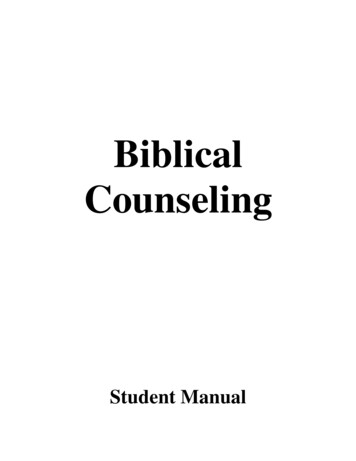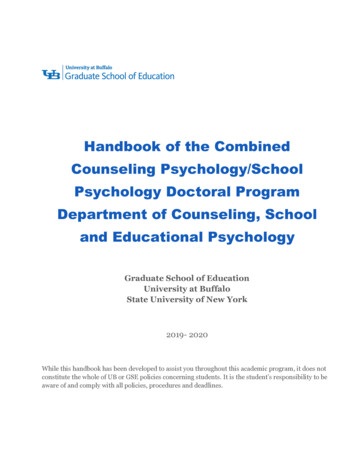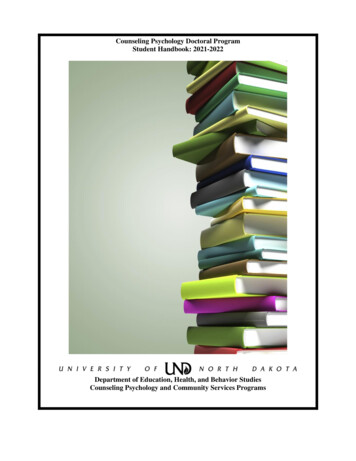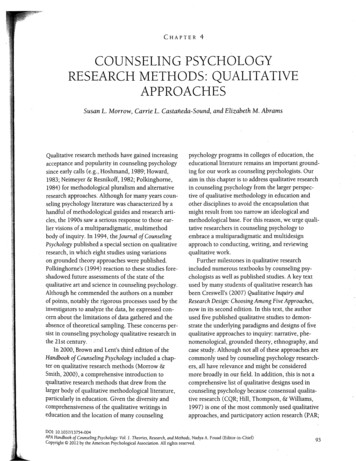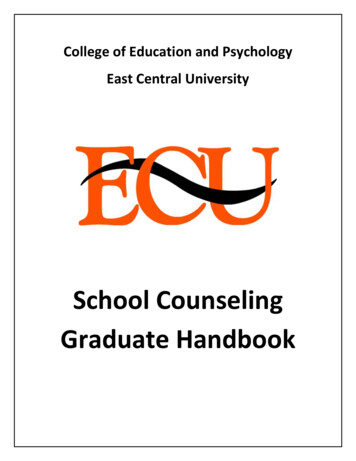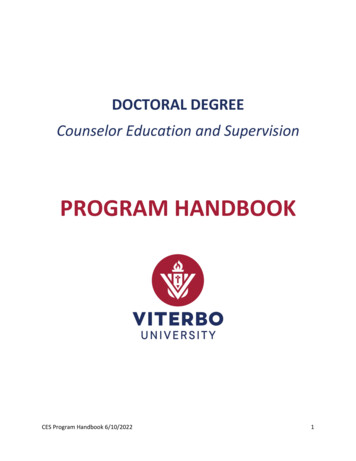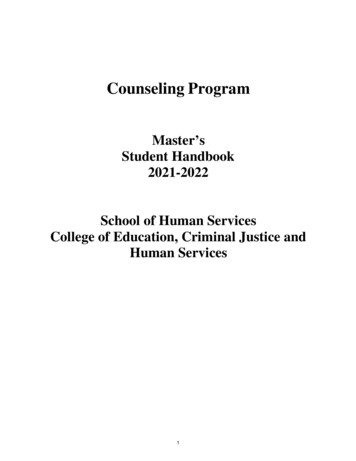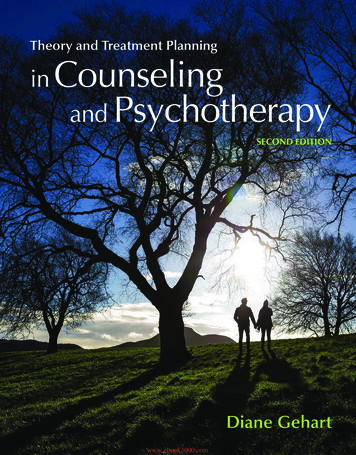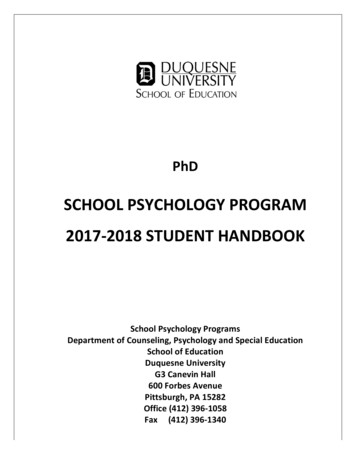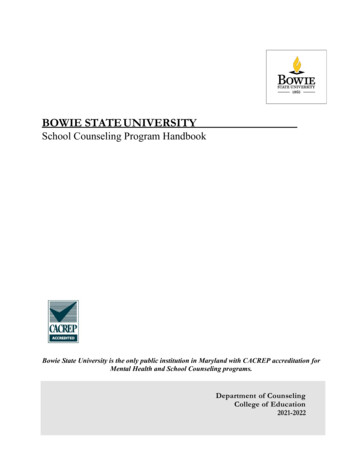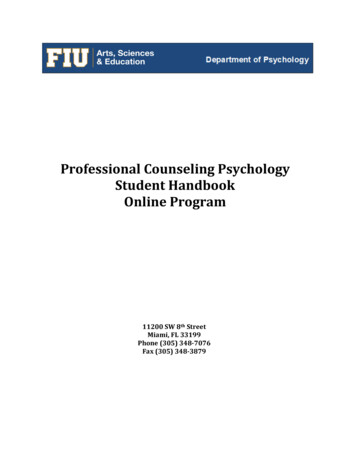
Transcription
Professional Counseling PsychologyStudent HandbookOnline Program11200 SW 8th StreetMiami, FL 33199Phone (305) 348-7076Fax (305) 348-3879
Table of ContentsInformed Consent. 5PCP Terms and Conditions of the Program . 6Student Survival Guide & Tips . 8Program Curriculum . 10Course Descriptions . 13Graduation Information. 16CPCE Exam Information . 17Alumni Data Form . 20Graduation Checklist . 21Change of Contact Information . 22Policy & Procedure for Remediation . 23Notification of Impairment . 24INDIVIDUALIZED REMEDIATION PLAN (IRP) . 25Sample Syllabus for Remedial Professional Development . 26Licensing Information . 29Practicum & Internship Verification Form . 30Obtaining a License . 31Education Worksheet . 32FAQ’s Mental Health Counseling License . 33PCP Online Student Handbook August 20202
Counseling Psychology Faculty & StaffCounseling Psychology FacultyProfessor, Psychology Department Chair, Jeremy Pettit, Ph.D.Email Address: jpettit@fiu.eduProgram Director, Associate Teaching Professor, and Associate Chair, Kristin Nichols-Lopez, Ph.D.Email Address: knichols@fiu.eduAssociate Professor, Paulo Graziano, Ph.D.Email Address: pgrazian@fiu.eduTeaching Professor, Internship Faculty Supervisor, Lisa Arango, Ph.D., LMHCEmail Address: arangol@fiu.eduVisiting Associate Teaching Professor, Practicum Faculty Supervisor, Jessica Robb Mazzant, Ph.D.Email Address: jrobb@fiu.eduAssociate Professor, Elisa Trucco, Ph.D.Email Address: etrucco@fiu.eduTeaching Professor, Paige Telan, Ph.D., LMHCEmail Address: telanp@fiu.eduAdjunct Faculty, Erika Coles, Ph.D.Email Address: ecoles@fiu.eduStaffProgram Coordinator: Yaimara Roman GonzalezEmail Address: yromango@fiu.eduPsychology Department Office Manager: Jackie PenaEmail: jmpena@fiu.eduPCP Online Student Handbook August 20203
Counseling Psychology Master’s ProgramThe information contained in this Handbook is designed to guide students through the educational and clinicaltraining experience requirements necessary for completing the master’s degree in psychology with aspecialization in counseling, and for obtaining eligibility for a license as a Mental Health Counselor as outlinedin Florida Statute 491. The degree requirements for the Counseling Psychology Master’s program are designedto be consistent with the state licensure requirements, however, the Board of Clinical Social Work, Marriage &Family Therapy and Mental health Counseling meets several times annually and may change the rules outlinedin Chapter 491 at any meeting. It is recommended that all students obtain a copy of the Florida Statutes (Lawsand Rules) governing the profession. Students should stay current with changes and new information bymaintaining contact with the Florida Board.Division of Medical Quality AssuranceBoard of Clinical Social Work, Marriage and Family Therapy and Counseling Psychology4052 Bald Cypress WayTallahassee, Florida ov(850) 245-4474It is recommended that Students join the Florida Mental Health Counselors Association (FMHCA), which offersimportant information regarding upcoming changes in the laws and rules as well as other vital information.Their website is http://www.fmhca.org/It is also suggested that students planning to have a career in Psychology and Counseling join the AmericanCounseling Association and the American Psychological Association. They both offer student memberships,many discounts, publications, etc. and they offer student liability insurance.ACA Membership Services: 800-347-6647 x. 222, http://www.counseling.org/.APA Membership Services: 800-374-2721 http://www.apa.org/students.Student Liability Insurance can be obtained through, Healthcare Providers Service Organization:www.HPSO.comYou are responsible for the material in this handbookMost of the counseling program policies and requirements are explained in the Student Handbook –please readall of it; you are responsible for all of it. You will be asked to sign a form, indicating that you have read all thematerials and understand that you are responsible for knowing and complying with program requirements.PCP Online Student Handbook August 20204
Informed ConsentDescription of Course Expectations and Program ExperiencesThe course content and experiential activities in the Professional Counseling Program (PCP) are designed to afford studentsthe opportunity to advance their personal, intellectual, and professional development. Throughout the program of study, youwill be expected to receive and integrate feedback concerning your personal, academic, and professional strengths, limitations,and performance as a counselor.The expectations of the counseling curriculum are that you will explore and recognize the effect that your personal beliefs,values, issues, emotions, and behaviors have on your ability to function as a counseling professional. Students in the CounselingPsychology Master’s Program are encouraged to seek out experiences for personal growth and reflection (i.e., personalcounseling), many of which are offered online, while in the program to assist in this self-reflective process. This service isoffered free of charge for students at the FIU Counseling Center.The various teaching methods, courses, practica, and internships will require that you develop and demonstrate yourcounseling skills as you work with other students in role-play scenarios and with clients in actual counseling sessions. You willbe required to share audio and/or video tapes of these sessions with your supervisors, instructors, and peers for feedback. Inaddition to technical feedback about your developing counseling and interviewing skills, you will be asked to consistently andsystematically examine your behaviors, beliefs, and emotions in relation to your counseling activities and experiences.Student ResponsibilitiesIt is the student’s responsibility to know and follow the American Counseling Association Code of Ethics. According to the Code,counselors-in-training have a responsibility to adhere to the laws, rules, and policies that govern professional behavior at theplacement setting. Furthermore, students have the same obligation to clients as those required of a professional counselor.Impairment and RemediationIf, in the professional judgment of a supervisor, instructor, or faculty member, a student’s behavior is deemed substandard,unethical, illegal, and/or professionally unbecoming at any time during the course of training, a student may be referred forfaculty review and remediation. At that time the Faculty Review Committee will be called to review the performanceevaluations, record, and behavior of the student and will make recommendations as to whether the student should refrain fromproviding counseling services and/or develop a plan for remediation (see appendix in manual for full explanation of policy).The 2014 American Counseling Association Code of Ethics provides the foundation for our ethical standards. Section F.9.bstates that “Counselor educators do the following 1) assist students in securing reme- dial assistance when needed, 2) seekprofessional consultation and document their decision to dismiss or refer students for assistance, and 3)ensure that studentshave recourse in a timely manner to address decisions requiring them to seek assistance or to dismiss them and providestudents with due process according to institutional policies and procedures.”Attestation StatementI am willing to adhere to the principles, requirements, and student responsibilities as described. I have also read thedescription of course requirements and program experiences required in the curriculum for the program. I am willing toparticipate fully in the courses and requirements of the Professional Counseling Program. I further understand that acourse grade of B- or better and a GPA of 3.0 or higher must be obtained to progress in, and graduate from, the program.Student NamePCP Online Student Handbook August 2020Signature & Date5
PCP Terms and Conditions of the ProgramThis Agreement specifies the terms and conditions under which the School of Integrated Sciences and Humanity ofFlorida International University will offer a professional program for students seeking a Master of Science inPsychology with a concentration in Counseling Psychology. Each student participating in the program must acceptthe terms and conditions outlined below prior to starting their first semester.Cohort IntegrityA. The program structure is that of lock-step, cohort program. Students need to adhere to program scheduleat all times.B. The consequence for skipping or unsatisfactorily completing a course or program component includes, butis not limited toa. one course forgiveness- withdraw from current cohort and join the students in the following yearto repeat the failed course when the course is offered again, should the program be offered.Forgiveness will only be allowed for one course. Unsatisfactory completion of more than one coursewill be cause for dismissal from the program.b. automatic withdrawal from the program with an option to re-apply for the next admission termIt is at the discretion of the Program Director, Program Supervisor(s), and/or Course Instructor(s) which ofthe delineated consequences will apply. Decisions are made on a case by case basis and will becommunicated to the student in writing.CurriculumA.Credits. This is a 60-semester hour, lock-step graduate program. The program consists of 8 semesters (3-4courses per term).B.Clinical Experience Hours. Students are required to complete clinical experience hours as outlined by theprogram. If a student is unable to complete these hours according to their semester requirements, thestudent will be considered non-compliant with program requirements and may be withdrawn from theprogram. Students must receive a passing grade in the clinical experience course(s) each semester beforemoving forward with each step in the clinical training process. This includes both Practicum and Internshipcourses.C.Location and Scheduling of Course Offerings. All of the program courses will be offered online. Some courseswill be synchronously presented (meaning all students attend an online platform at the same time), somecourses will be asynchronous (meaning students will do work flexibly, though there will be set content andassignment deadlines), and some courses will be a blend of the two approaches.D.Maintenance of Good Standing. In order to remain in good standing in the program students must maintaina 3.0 (out of 4.0) grade point average during their studies. Additionally, students must obtain a grade of Bor better in all of their courses. If a student receives a failing grade (i.e. a grade of C or lower) the studentwill be seen as not completing the program satisfactorily and may be withdrawn from the program (seesection on cohort integrity). Students whose GPA falls below a 3.0 will be given a warning, probation, and/ordismissal as outlined below.PCP Online Student Handbook August 20206
a. Warning: A PCP student whose cumulative GPA falls below 3.0 will be placed on warning for thefollowing term. Warning indicates academic difficulty.b. Probation: A PCP student on warning whose cumulative GPA remains below the 3.0 after the nextterm will be placed on probation. Such a student will have one semester to raise his/her cumulativeGPA to 3.0 or above. Probation indicates serious academic difficulty.c. Dismissal: A graduate student on probation who does not improve his/her cumulative GPA abovethe 3.0 level during the next term will be automatically dismissed from the program. The dismissalis for a minimum of one year. After one year, the student may apply for readmission to theUniversity in the same or different program.E. Expectations for Student Professional, Personal, and Academic Development. In addition to their academicperformance, students will be evaluated throughout the program on three criteria:1. Ability to understand and adhere to the counseling profession’s professional and ethical standardsof behavior;2. Ability to demonstrate adequate counseling skills and competencies; and3. Freedom from any psychological impairment that may act as a barrier to their ability to provideeffective professional counseling.If at any time, one or more of these expectations are not being met, the student will be referred for Remediation(see Remediation Policy). Students deemed incompetent to complete the required coursework, practicum, and/orinternship due to failed remediation efforts will be dismissed from the program.Acceptance of Terms and ConditionsI, , have read, understand, and accept the terms and conditions stated above inthis Agreement and in the accompanying Program Information and Policies brochure. I understand that changesmay be made based on changes in University policies and State of Florida laws, rules, and regulations.SignaturePCP Online Student Handbook August 2020Date7
Student Survival Guide & TipsContact Information: email, phones, and addressesThe Counseling Program, and the psychology department in general, depend on e-mail as the main methodof communication. You must use your active FIU e-mail account and have it registered with the CounselingProgram Office, your Practicum/Internship site when applicable, and the Department Main Office. This emailmust be checked daily. It is your responsibility to ensure that you receive important communications. If yourcontact information changes at any time during the course of completing the program please fill out the contactinformation page found in the Program Forms, and turn into the following people: Counseling Program Office staff Practicum/Internship site (when applicable)Disability/Impairment IssuesIf you have any impairment, including a temporary impairment, due to health, psychological, family, or personalreasons, understand that it is your responsibility to let those who supervise you know of yourdisability/impairment. Personal problems do not “excuse” you from conducting yourself in a professionalmanner (e.g. meeting clients on time, showing up for class, etc.). Faculty, instructors, and supervisors are willingto make reasonable accommodations, if they are consulted in a timely manner.If you have a more extensive disability (e.g. Learning Disability, a physical or mental health condition) that mayaffect your academic, research, or clinical performance, you should consult with the Disability Resource Center.Reasonable accommodations can be made if a disability is documented, but needs to be done “before” a problemoccurs not after.Contact information for the Disability Resource Center is as follows:University Park CampusGC 190Voice: (305) 348-3532TTY: (305) 348-3852Fax: (305) 348-3850University Graduate School (UGS)Florida International University's Graduate School assists both prospective and current graduate students in thepursuit of graduate-level programs of study.At the UGS website you can find information and forms for many things, including but not limited to: Time limits for Graduation Transfer Credit Limits Leave of Absence Graduation Graduate Student Catalog Graduate Policies & ProceduresPlease take some time to visit their website (http://gradschool.fiu.edu/), as you will find it useful for addressingmany different issues. The UGS website also includes important deadlines for graduate students. All of theinformation in this section is found in the Graduate Course Catalog. It is highly recommended that you download acopy of the Graduate Course Catalog.PCP Online Student Handbook August 20208
Academic CalendarIt is important that you stay up to date with university dates and deadlines. You can find all important Universitydeadlines are available on the Academic Calendar. This is the same calendar that faculty, instructor, andadministrators use to plan their courses. The academic calendar also includes dates in which the University is closed(i.e. holidays). You are responsible for obtaining a copy of the academic calendar and adhering to the university’sdeadlines for registration, drop/add, graduation application, etc.SyllabiIt is important that you keep all your syllabi from all your graduate courses!!! You will need to use your syllabias evidence that you have covered a specific content area as part of one or more courses. Thus, it is important tokeep a copy of your course syllabi for ALL graduate level classes. You will need your syllabi when you register tobecome an intern with the State of Florida. You can also find brief descriptions of our courses in the graduatecatalog, student program manual, and program website.Emergency InformationIn the event of any type of emergencies, we would like our students to be prepared. Our main concern is the safetyof our students! Please become familiar with the University’s policies in cases of emergencies. FIU’s Office ofEmergency Management has information to help you personally prepare for emergencies (including hurricanes),as well as notify the university community about any emergencies. Please visit the Office of Emergency ManagementWebsite.They will provide you with definitions of emergencies, notification procedures, and resources. Some quickresources include: FIU’s emergency hotline : 305-348-HELP (available 24/7) FIU’s emergency website: www.fiu911.org (goes live as soon as the university has declared an emergencysituation) FIU Alert is an emergency notification system used to notify the FIU community of any imminent orimmediate threat to life safety. It is designed to reach as many people as possible in a timely manner whilealso maintaining redundancy should one or several of the methods fail. Students who are in cohortprograms must log into http://my.fiu.edu (instructions) and provide their cell phone number to receive FIUAlerts.EthicsYour professional training at FIU includes becoming socialized to the role of a counselor. As a counselor in trainingyou must conduct your clinical, and personal actvities in a manner that is consistent with the American CounselingAssociation (ACA) ethics guidelines and standards. As a graduate student (effective immediately) you are requiredto know and abide by the ACA ethics guidelines and standards. You may download a free copy of the guidelines atany time by going to the ACA website.Professional ConductCounseling students are in a professional training program and are expected to behave in a professional mannerthroughout their training. Examples of unprofessional behavior include: frequently arriving late for classes,supervision, clinical appointments with clients, or other professional meetings; inappropriate dress during clinicalactivities. Evidence of unethical behavior in research, clinical work, or classes (e.g. cheating on exams, or plagiarism,unethical or inappropriate behavior at practicum site) will be dealt with according to the policies of the university.Students violating professional conduct policies may be referred for remediation, which could lead to dismissalfrom the program.PCP Online Student Handbook August 20209
Program CurriculumDescription of CurriculumGoals: To prepare students for the independent and licensed professional practice of mental health counseling.Our program focuses on providing students with a solid foundation in Counseling Psychology, and opportunitiesfor specializing in a range of clinical problems and diverse populations.Objectives: To offer courses that emphasize an evidence-based structure for customizing the therapeutic relationship(ESR’s) and treatment methods (EST's) to individual clients. To offer courses and clinical training that fulfill the master’s degree requirements for a Florida license inMental Health Counseling. To facilitate students’ growth toward a professional identity that focuses on development of counselorcompetencies, cultural awareness, and ethical standards in line with the APA and ACA Codes of Ethics. To offer students an opportunity to specialize in a particular clinical problem and specific populationthrough faculty guided research and selected clinical training experiences. To facilitate students’ recognition of what qualifies as evidence of effective “best practice” through theinstruction of, and exposure to, methods of outcome research designed to tailor the therapeutic relationship develop appropriate treatment goals, implement effective evidence-based treatment and measure treatment outcome.To provide instruction & skills training to enable students to utilize applied behavioral science andcounseling theories, and evidence-based methods and techniques, for the purpose of describing, preventing, and treating psychological problems, and enhancing mental health and human development.PCP Online Student Handbook August 202010
I. COURSEWORKAll coursework is completed in sequence following an eight-semester academic plan.II. CLINICAL TRAINING (15 credit hours)Requirements for the completion of the 1000 hours of clinical experience follow the CACREP guidelinesfor practicum and internship and CACREP standards for clinical instruction.400 hours of practicum600 hours of internshipForty percent of clinical work is in direct client contact.Trainees will receive 1 hour of individual supervision per week, and1 ½ hours of group supervision per week by a qualified professional.Formal evaluation of student’s performance.CLP 6945 Clinical Practicum (6)Prerequisite: Admission to programThis is the first semester of supervised experience in clinical techniques and methods. Topics include basicoverview of ethics, professional identity, basic interviewing skills, and group supervision. Assessment, clinicalinterviewing and case presentation methods skills are covered.CLP 6943 Advanced Clinical Practicum (as needed)Prerequisite: Completion of CLP 6945This is the second and third semester of the supervised clinical practicum where students are given the opportunityto sharpen basic counseling skills through their work with clients. Tapes & transcriptions of counseling sessionsare shared for peer review and feedback during group supervision. Counselor counter transference issues areintroduced and reviewed.CLP 6948 Clinical Internship (6)Prerequisite: Completion of CLP 6945 and CLP 6943Supervised Clinical experiences in which students are engaging in individual, group, and family counseling/psychotherapy sessions. Course focus is on the development of a professional identity through individual and groupexercises designed to promote self-awareness and insight pertaining to becoming a professionalcounselor/therapist.CLP 6949 Advanced Clinical Internship (3)Prerequisite: Completion of CLP 6948.Advanced supervised clinical experiences in which students are engaging in individual, group, and familycounseling/psychotherapy sessions including treatment planning and implementation. Students will have theopportunity to develop an in depth case study and advanced case conceptualization based on a specific client andclinical problem, thereby demonstrating the development of a treatment plan and implementation, application of aclinical intervention or treatment of the problem, and treatment outcome.Location of Practicum and Internship. Students will ultimately be responsible for identifying a practicum andinternship site(s) at which they will receive their supervised clinical training experience. Students will be providedwith a listing of approved affiliated placement sites as a starting point. Additional sites identified by the student willbe vetted by the program administration and University affiliation agreement must be executed before placementsare finalized. The practicum/internship site must be within 75 miles of the student’s registered address with theDepartment and Program. If the student is unable to locate an appropriate site within 75 miles, then they maypetition the Program for an exception, which will be considered on a case-by-case basis via sub-committee. Thestudent will be invited to work with the PCP program administration on identifying a practice site(s). PracticumPCP Online Student Handbook August 202011
and Internship sites must have an identified, licensed supervisor who agrees to provide the required, weeklysupervision (minimum 1 hour), and the site must agree to allow therapy sessions to be recorded. It is advised thatstudents complete both their practicum and internship experience at the same practice or site; however, if there iscompelling reason why the student should have different practicum and internship experiences, then this may beapproved by the faculty supervisors of the respective courses and Program Director. Students will typicallyinterview with an identified site to determine fit, acceptance, and site alignment with program requirements. Priorto beginning the supervised clinical experience, a signed agreement among the PCP program, the student and thesite supervisor must be executed. The requirements of this agreement will be continually evaluated during thecourse of clinical training to ensure that a high-quality experience that meets requirements is being experienced byall parties. Further guidance and specifics will be provided as the student approaches the time for this programrequirement.III. Comprehensive ExamIn addition to coursework and clinical training requirements, students are required to receive a passing score onthe Counselor Preparation Comprehensive Examination (CPCE) to become eligible for graduation. The CPCE examis a 160 question multiple choice exam administered by the National Board for Certified Counselors (NBCC).The exam may be repeated at the student’s expense.PCP Online Student Handbook August 202012
Course DescriptionsPCO 6206 Principles & Practices of Counseling & Psychotherapy (3):License Content Area: Counseling Theories and PracticeThis course reviews counseling theories and advanced practice with a focus on patient assessment, caseconceptualization, treatment planning, and measurement of treatment outcome. This course will also guidestudents through the development of an advanced case conceptualization and a personal approach to counselingand psychotherapy based on methods of psychotherapy integration.CYP 6536 Principles & Methods of Psychological Consultation (3):Core Psychology CourseThis course provides an introduction to basic counseling skills and theories and looks at variables of the counselorclient relationship and the stages of counseling and psychotherapy. The course will help students develop anunderstanding of how theoretical perspectives of counseling and psychotherapy approaches can be applied topatients’ presenting problems, the development of treatment goals and therapeutic intervention (e.g., basicstrategies and techniques).DEP 5796 Developmental Research Methods for Counselors (3):Core Psychology CourseThis course provides an overview of the latest research and research methods used in psychotherapy and evidencebased treatments.PSY 5939 Advanced Case Conceptualization (3):Core Psychology CourseThis course will provide instruction and guidance for completing the advanced case conceptualization. Theproject for this course will result in a paper and formal presentation of a clinical case the student has treated atthe Internship Site. A formal evaluation of the Written Content, Oral Communication, and Content Knowledge willbe completed by faculty. Students will develop literature reviews, identify evidence-based assessments andinterventions used to treat a particular clinical problem, develop treatment plans, and be able to measure andevaluate treatment outcomes of
Professional Counseling Psychology Student Handbook Fall 08 Professional Counseling Psychology Student Handbook Online Program 11200 SW 8thStreet Miami, FL 33199 Phone (305) 348-7076 Fax (305) 348-3879 PCP Online Student Handbook August 2020 2 Table of Contents
